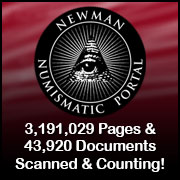
About UsThe Numismatic Bibliomania Society is a non-profit association devoted to the study and enjoyment of numismatic literature. For more information please see our web site at coinbooks.org SubscriptionsThose wishing to become new E-Sylum subscribers (or wishing to Unsubscribe) can go to the following web page link MembershipThere is a membership application available on the web site Membership Application To join, print the application and return it with your check to the address printed on the application. Print/Digital membership is $40 to addresses in the U.S., and $60 elsewhere. A digital-only membership is available for $25. For those without web access, write to: Charles Heck, Treasurer AsylumFor Asylum mailing address changes and other membership questions, contact Chuck at this email address: treasurer@coinbooks.org SubmissionsTo submit items for publication in The E-Sylum, write to the Editor at this address: whomren@gmail.com
BUY THE BOOK BEFORE THE COIN |
- WAYNE'S WORDS: THE E-SYLUM JANUARY 3, 2020
- NBS BIBLIOTALK ON SPECIAL COLLECTIONS, ART BOOKS
- CHARLES DAVIS NEW TITLES IN STOCK
- NEW BOOK: HISTORY AND COINAGE OF MACHIN'S MILLS
- NEW BOOK: FRACTIONAL CURRENCY OVERVIEW
- D. WAYNE JOHNSON (1930-2020)
- HISTORY OF THE METRIC SYSTEM CONTROVERSY
- VIDEO: THE ROARING 1980'S COIN MARKET
- SECOND PHILADELPHIA MINT IMAGE QUESTION
- MORE STORIES OF UNNAMED COIN SOURCES
- THE ULYSSES S. GRANT MEDAL FOR VICKSBURG
- NOTES FROM E-SYLUM READERS: JANUARY 3, 2020
- SURVEY RESULTS: COLLECTING PREFERENCES
- 2020 BRINGS UNEXPECTED BOOST TO NUMISMATICS
- VOCABULARY TERM: COINABILITY
- MARTIN LUTHER BEISTLE (1875-1935)
- HARVEY STACK'S NUMISMATIC FAMILY, PART 86
- RECOLLECTIONS OF D. WAYNE JOHNSON
- A DICK JOHNSON E-SYLUM SAMPLER
- HERITAGE OFFERS PARTRICK BRASHER DOUBLOONS
- STACKS-BOWERS OFFERS RARE HAITIAN NOTES
- DNW NORTH YORKSHIRE MOORS PART IV SALE
- NUMISMATIC NUGGETS: JANUARY 3, 2020
- SELECTIONS FROM DAVE WNUCK MAKING THE GRADE #44
- BEWARE ONLINE FAKE COIN SALES
- REGULATIONS FOR THE ANTIQUITIES MARKET
- ANOTHER MEDIEVAL CHINESE COIN FOUND IN ENGLAND
- VIDEO DEPICTS WRONG NOBEL MEDAL
- SECRET TO THE PERFECT ZOOM BOOKSHELF
- CAPITALISM RESOLVES COIN SHORTAGE PROBLEM
- TOOTH FAIRIES
Content presented in The E-Sylum is not necessarily researched or independently fact-checked, and views expressed do not necessarily represent those of the Numismatic Bibliomania Society.
WAYNE'S WORDS: THE E-SYLUM JANUARY 3, 2020
 New subscribers this week include:
Piotr Krzewminski, courtesy Pablo Hoffman; and
Loretta Schultz.
Welcome aboard! We now have 6,602 subscribers.
New subscribers this week include:
Piotr Krzewminski, courtesy Pablo Hoffman; and
Loretta Schultz.
Welcome aboard! We now have 6,602 subscribers.
Thank you for reading The E-Sylum. If you enjoy it, please send me the email addresses of friends you think may enjoy it as well and I'll send them a subscription. Contact me at whomren@gmail.com anytime regarding your subscription, or questions, comments or suggestions about our content.
This week we open with a new podcast, an update from literature dealer Charlie Davis, two new books, the loss of a numismatic giant, updates from the Newman Numismatic Portal, and more.
Other topics this week include the metric system in the U.S., the 1980s coin market, the Ulysses S. Grant Vicksburg medal, collecting preferences, 2020's boost to numismatics, M. L. Beistle, Brasher Doubloons, Haitian paper money, and the tooth fairy coin.
To learn more about the coinage of Machin's Mills, U.S. Fractional Currency, the founding of Coin World, the Collins hoard of 1828 half cents, the Robison Collection, the Gloucester Shilling, coinability, akcidefets, the Oliver Cromwell 50 shilling gold coin, a temperance movement pledge token, the Large Cent pie crimper wheel, the Island of Misfit Books, and a bad check for over a million dollars, read on. Have a great week, everyone!
Wayne Homren
Editor, The E-Sylum
NBS BIBLIOTALK ON SPECIAL COLLECTIONS, ART BOOKS
The latest episode of the Numismatic Bibliomania Society podcast is now available for listening. Check it out! It's on the NBS web site but also available elsewhere. Vice-President/Secretary Len Augsburger provided this report. -Editor
NBS Podcast "Special Collections and Art Books, with Cassie Brand" Posted
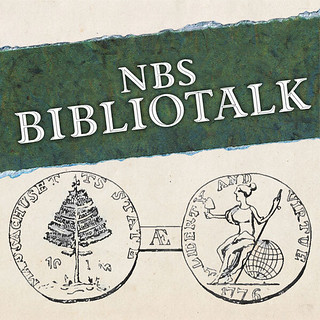 The latest episode of the NBS Bibliotalk podcast, "Special Collections and Art Books" is now available on the NBS website and other popular podcasting platforms such as Buzzsprout. Lianna Spurrier, Bibliotalk producer, interviews Cassie Brand, Curator of Rare Books at Olin Library, Washington University in St. Louis. Brand is an enthusiastic lover of the book, and her excitement for the topic enlivens this wide ranging 45-minute discussion.
The latest episode of the NBS Bibliotalk podcast, "Special Collections and Art Books" is now available on the NBS website and other popular podcasting platforms such as Buzzsprout. Lianna Spurrier, Bibliotalk producer, interviews Cassie Brand, Curator of Rare Books at Olin Library, Washington University in St. Louis. Brand is an enthusiastic lover of the book, and her excitement for the topic enlivens this wide ranging 45-minute discussion.
Brand covers the Southwick copy of the Declaration of Independence at Washington University, donated by the Eric P. Newman Numismatic Education Society, along with books from the Thomas Jefferson library that resided in the circulating stacks of Olin Library for many years, until their provenance was discovered. Brand also covers book thieves, the New York International Antiquarian Book Fair, and books as artistic objects, a concept that stretches the definition of a "book." Brand is in demand as a guest lecturer at Washington University and readily conveys her passion for the subject to appreciative audiences.
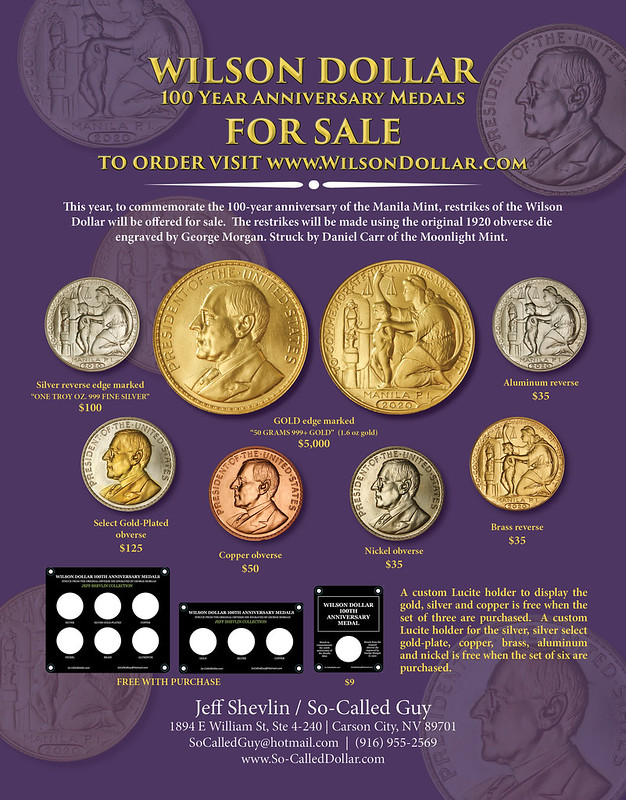
CHARLES DAVIS NEW TITLES IN STOCK
Numismatic literature dealer Charlie Davis writes that he has a number of new titles in stock. -Editor
It is the beginning of a New Year, and a flood of new titles is coming into stock.
C4 has just published The History and Coinage of Machin's Mills by Messrs Howes, Rosen and Trudgen, covering one of the previously least documented areas of colonial numismatics. In its 6x9" format, it is designed to be easier to take to a show (whenever they restart) than the more traditional 9x12" size. It is available on our web site at $65.00
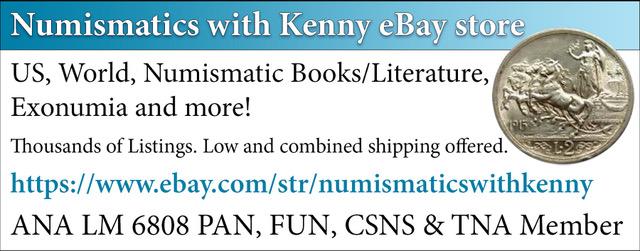
NEW BOOK: HISTORY AND COINAGE OF MACHIN'S MILLS
A new book has been published on the enigmatic colonial-era coinage of Machin's Mills. -Editor
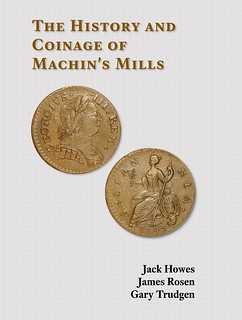 The Colonial Coin Collectors Club (C4) announces the latest in its series of publications – The History and Coinage of Machin's Mills by Jack Howes, James Rosen, and Gary Trudgen.
The Colonial Coin Collectors Club (C4) announces the latest in its series of publications – The History and Coinage of Machin's Mills by Jack Howes, James Rosen, and Gary Trudgen.
When writing a book about coins that have been surrounded for generations by mystery and controversy regarding their sponsors, manufacturers, places and dates of origin, it became inherently obvious that we needed to describe these coins in detail and examine the lives and times of the personalities responsible for their creation during the closing years of the Confederation Period. Not only was it essential to clear up old ideas and to set the records straight, but it seemed necessary to expand our thinking about these coins which have weaved their way into our consciousness of pre-federal coppers.
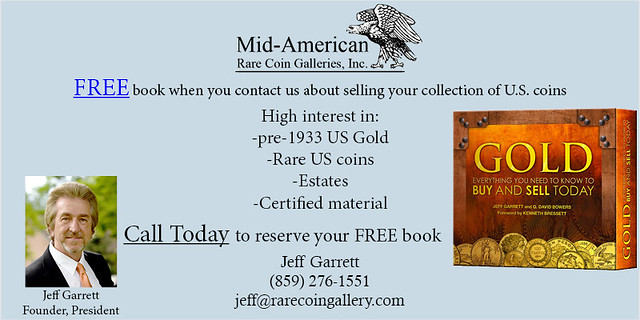
NEW BOOK: FRACTIONAL CURRENCY OVERVIEW
The Currency Proof Club's new book Fractional Currency Overview is ready. Here's the announcement. -Editor
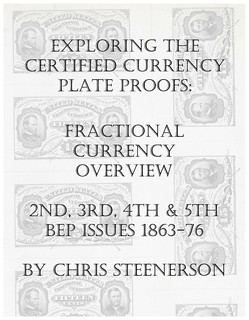 Exploring the Certified Currency Plate Proofs: Fractional Currency Overview - 2nd, 3rd, 4th & 5th BEP Issues - 1863-1876
Exploring the Certified Currency Plate Proofs: Fractional Currency Overview - 2nd, 3rd, 4th & 5th BEP Issues - 1863-1876
by Chris Steenerson
Color or B&W Paperback
8.5x11
144 pages
Color Version $52.99 ISBN-13: 979-8582620549
B&W Version $24.99
ISBN-13 : 979-8588643757
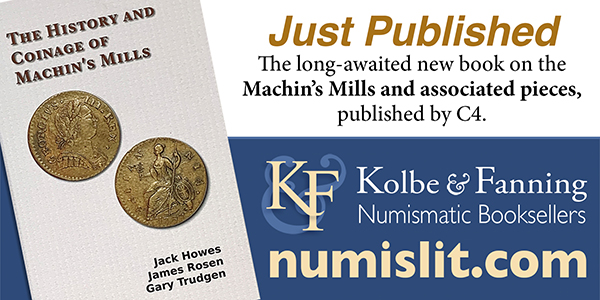
D. WAYNE JOHNSON (1930-2020)
We knew him as Dick Johnson. Richard Wayne Johnson published under the name D. Wayne Johnson but was informally known as Dick. Well known in numismatics as the founding editor of Coin World, important in the early years of the Rittenhouse Society, research director of Medallic Art Company and author of important books on medals and minting technology, he became an early and frequent contributor to The E-Sylum with an unbroken string of weekly contributions that will likely never be surpassed. He passed away December 29, 2020 at the age of 90. He will be greatly missed. Rest in peace.
Dick once wrote that "The E-Sylum is closer to what I wanted Coin World to be originally, somewhat more for the advanced coin collector. Advanced collectors tend to seek more information of auctions and the literature." A sampling of a few of Dick's over 1,000 E-Sylum contributions appears elsewhere in this issue. And with his family's permission, we'll continue the Vocabulary article based on Dick's Encyclopedia of Coin and Medal Terminology. He may be gone, but he won't be forgotten.
Here is an obituary submitted by his family. The first photo shows him in 2010 with his research files. The second one, courtesy of Coin World, shows him and his wife Shirley reviewing the first issue of the newspaper. -Editor
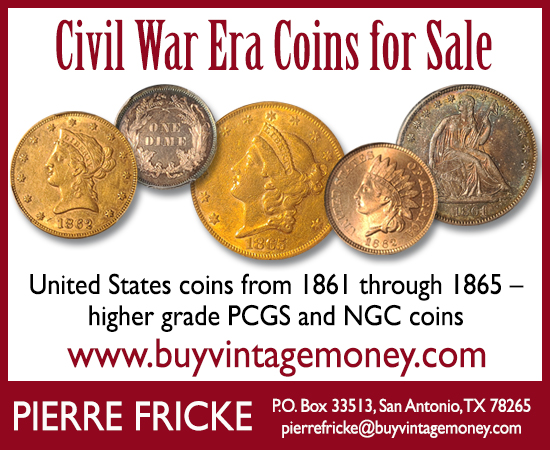
HISTORY OF THE METRIC SYSTEM CONTROVERSY
The latest addition to the Newman Numismatic Portal is a history of the metric system in the U.S. Project Coordinator Len Augsburger provided the following report. Thanks. -Editor
History of the Metric System Controversy
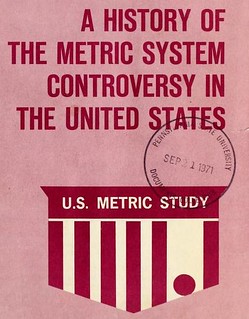 Numismatists tend to score higher in age demographics, and many readers will no doubt recall the 1970s metric system discussion in the United States. The Commerce Department created a number of studies at the time, few of which led to any substantial changes in the day to day lives of ordinary Americans, who continued to accumulate pounds (not the monetary kind), drive more miles, and drink gallons of sugary soda. Newman Portal recently added one of these studies, A history of the metric system controversy in the United States : U.S. metric study interim report, published by the U.S. Department of Commerce in 1971.
Numismatists tend to score higher in age demographics, and many readers will no doubt recall the 1970s metric system discussion in the United States. The Commerce Department created a number of studies at the time, few of which led to any substantial changes in the day to day lives of ordinary Americans, who continued to accumulate pounds (not the monetary kind), drive more miles, and drink gallons of sugary soda. Newman Portal recently added one of these studies, A history of the metric system controversy in the United States : U.S. metric study interim report, published by the U.S. Department of Commerce in 1971.
THE BOOK BAZARRE
VIDEO: THE ROARING 1980'S COIN MARKET
These are selections from the David Lisot Video Library that feature news and personalities from the world of coin collecting. David has been attending coin conventions since 1972 and began videotaping in 1985. The Newman Numismatic Portal now lists all David's videos on their website at:
https://nnp.wustl.edu/library/multimediadetail/522852
Here's one on the crazy, high-flying coin market of the 1980s. -Editor
Coin Tales from the Roaring 1980's Coin Market. June 1, 2016.
VIDEO: 17:38
John Highfill, Founder, National Dollar Roundtable,
David Lisot, Interviewer, CoinTelevision.com.
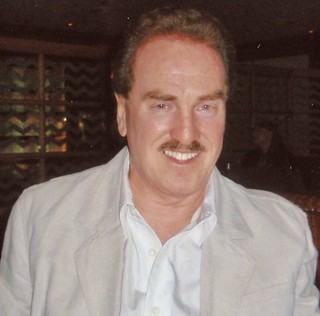 John Highfill was one of the most important marketmakers in all of numismatics in the 1980's. His bids for silver dollars helped create a boom for the entire industry as he supplied retailers with coins for their customers. Hear the tales of him attending more than 50 coin shows a year, how he bought an 1892-S Morgan in MS66 and lost money, how he participated with the PCGS Finest Known Morgan Collection, collections he has had, his company with 28 employees, his commitment to the CC Morgan market, the sale of a $50 Humbert Gold coin, how he took a bad check for over a million dollars and much more.
John Highfill was one of the most important marketmakers in all of numismatics in the 1980's. His bids for silver dollars helped create a boom for the entire industry as he supplied retailers with coins for their customers. Hear the tales of him attending more than 50 coin shows a year, how he bought an 1892-S Morgan in MS66 and lost money, how he participated with the PCGS Finest Known Morgan Collection, collections he has had, his company with 28 employees, his commitment to the CC Morgan market, the sale of a $50 Humbert Gold coin, how he took a bad check for over a million dollars and much more.
An excerpt of the video is available for viewing on the Coin Television YouTube Channel at:
https://youtu.be/L4O1MdIixSk

SECOND PHILADELPHIA MINT IMAGE QUESTION
David Sundman had a question about the images in Pete Smith's submission about the 2nd Philadelphia Mint's neighbor, the 7th Presbyterian Church. -Editor
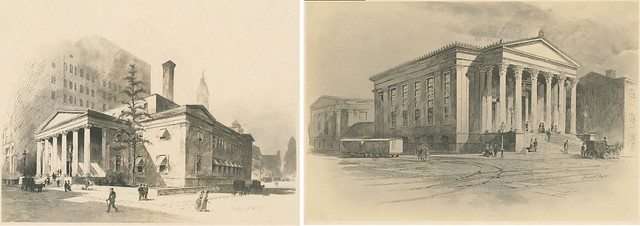
The description of the building on the left of the 2nd image is puzzling to me. Pete stated:
"I was not familiar with the building on the right. It was built as the 7th Presbyterian Church at the southeast corner of Broad and South Penn Square. Its back was next to the Second Mint which can be seen at the left side of the image."
The building on the left side of the 2nd image (the church) has only four pillars while the 2nd Mint front had six pillars. Is it really the 2nd Mint on the left side of the image, or some other building?
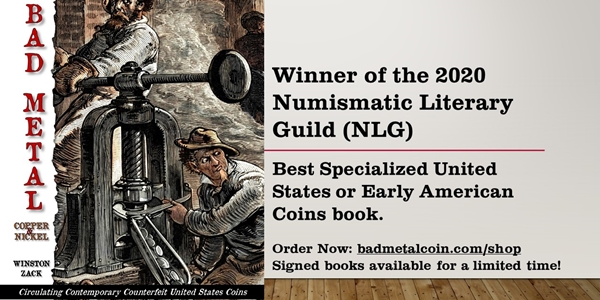
MORE STORIES OF UNNAMED COIN SOURCES
Two members of my Northern Virginia numismatic social group Nummis Nova chimed in about the story of Dreifus-Rosenthal 1804 dollar said to have appeared in Alexandria, VA. First, Dave Schenkman. -Editor
"Pete Smith's comments about the black man who had an 1804 silver dollar reminded me of an article I wrote for the Civil War Token Society in 2017 on the life of Henry Clay Ezekiel. His obituary notice in the November 1930 issue of The Numismatist cites a 1911 biographical sketch in which he related that
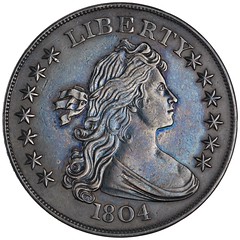 "... he became interested in coins while living in Richmond and that he became acquainted with Edward Cohen, who was in the banking and brokerage business in that city. One day while in the banker's office (about 1860) a Negro brought into him a lot of silver coins among which he found an 1804 dollar. Mr. Cohen later sold the dollar to his uncle, Col. M. J. Cohen, of Baltimore, for $100. This dollar became the Colonel Cohen 1804 dollar, one of the dozen or so known specimens of this date that many collectors regard as originals."
"... he became interested in coins while living in Richmond and that he became acquainted with Edward Cohen, who was in the banking and brokerage business in that city. One day while in the banker's office (about 1860) a Negro brought into him a lot of silver coins among which he found an 1804 dollar. Mr. Cohen later sold the dollar to his uncle, Col. M. J. Cohen, of Baltimore, for $100. This dollar became the Colonel Cohen 1804 dollar, one of the dozen or so known specimens of this date that many collectors regard as originals."
I found it interesting that two black men in Virginia owned 1804 dollars."
Um, yeah. Pete was careful to note that "These discoveries do not prove that Dreifus owned an 1804 dollar, but they do prove there was a man and location that match the Bosbyshell story." Next up, Bill Eckberg. -Editor

THE ULYSSES S. GRANT MEDAL FOR VICKSBURG
Last week Len Augsburger wrote about a massive (presumably bronze) medal of U.S. Grant struck at the U.S. Mint in 1894. An example had been struck in gold in 1865. While the whereabouts of the Sellers edge-inscribed 1894 bronze example is still unknown, the gold one is in the Smithsonian Institution. -Editor
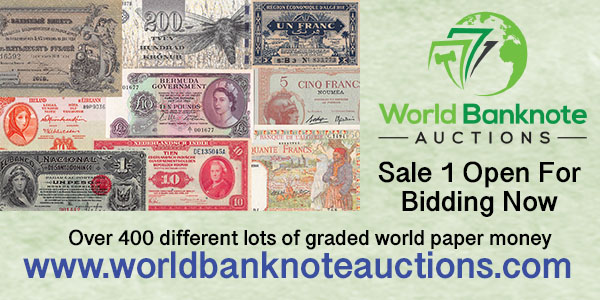
NOTES FROM E-SYLUM READERS: JANUARY 3, 2020
On the Return to Flanagan's Washington Obverse
Dave Lange writes:
"The entry about the new quarter dollar reverse included a comment from Pabitra Saha to the effect that the current quarter dollars have the infamous "spaghetti hair," but this isn't true. In the late 1980s the U. S. Mint did lose sight of the fact that Washington was wearing a periwig, and its sculptors gradually reshaped his hair into what appeared to be strands of noodles. This transformation occurred gradually between 1988 and 1993. This same very unnatural portrait was continued into the state and territory quarters of 1999-2009, albeit with an overall reduction of the bust size. By the time that the America the Beautiful series debuted in 2010 the Mint had become aware of the criticism surrounding the spaghetti hair, and it adopted a fairly accurate restoration of Flanagan's 1932 bust which has continued to the present day.
It's interesting that the Mint's press release of the 2021 quarter dollar shows a return to the offending noodles. I certainly hope that this was just an oversight by the marketing department and not an actual projection of the coin as it will be struck."
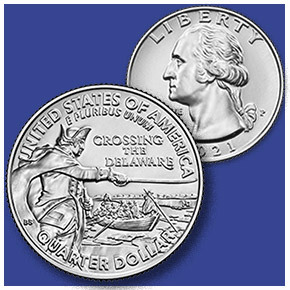
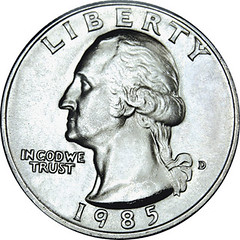
Yes, that image was a little scary, albeit not the full-blown spaghetti hair rendition. Since the obverse was not a focus of the press release, let's hope you're right and it was only a marketing department snafu. -Editor
To read the earlier E-Sylum article, see:
TREASURY CHOOSES NEW QUARTER REVERSE DESIGN
(https://www.coinbooks.org/v23/esylum_v23n52a18.html)
Other topics this week include laws regarding medals, the Dardanelles overprints text, medallist Marika Somogyi, and more coins encased in Lucite. -Editor
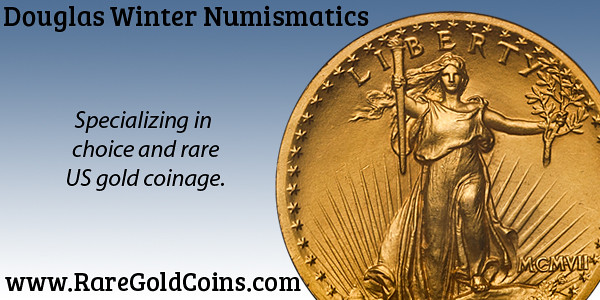
SURVEY RESULTS: COLLECTING PREFERENCES
Readers may recall that back in May, Franky Leeuwerck, a member of the International Bond and Share Society, had a survey running on his blog relating to collector preferences. His survey questions are relevant to all numismatic collections. Beauty, scarcity, historical significance, a good bargain and collection completeness, are incentives for collectors worldwide. Here are the results! -Editor
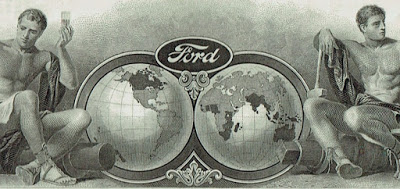
Do you prefer Beauty or are you more satisfied with A Good Bargain? When it comes to collecting what do you prefer?
On the occasion of this blog's 10th anniversary, I launched in May 2020 an online poll about five collecting motives :
- Scarcity
- Beauty
- A Good Bargain
- Collection Completeness
- and Historical Significance.

2020 BRINGS UNEXPECTED BOOST TO NUMISMATICS
In an email to customers this week, dealer David Kahn of David Kahn Rare Coins wrote about the unexpected and welcome surge in collector activity over the past year despite the loss of in-person hobby events. It's so great to hear that many of our dealers are doing well, and even better to learn of increased enthusiasm and new blood in the market. -Editor
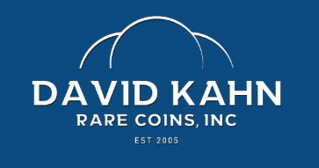 and that is something to celebrate. Ten months of 2020 were - to under-state the incredibly obvious - challenging in many respects. But there is hope and progress on several fronts. At DKRC, we are optimists generally, and especially so at present. Better days are surely ahead. And yet, as I've said many times in this space, there is plenty of good here and now.
and that is something to celebrate. Ten months of 2020 were - to under-state the incredibly obvious - challenging in many respects. But there is hope and progress on several fronts. At DKRC, we are optimists generally, and especially so at present. Better days are surely ahead. And yet, as I've said many times in this space, there is plenty of good here and now.
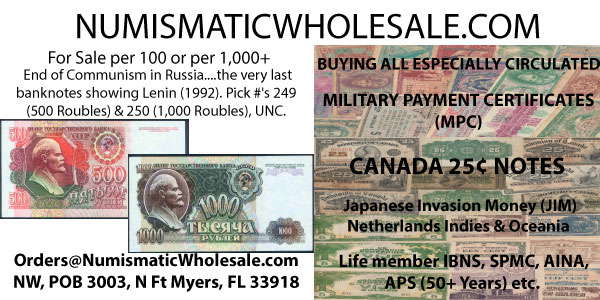
VOCABULARY TERM: COINABILITY
Here's another entry from Dick Johnson's Encyclopedia of Coin and Medal Terminology. -Editor
Coinability The suitability of a metal or alloy to take a sharp, clear, struck impression between dies in a coining press under normal coinage operations, at room temperature (cold coining). Not all metals have the same property of surface displacement that allows surface metal to flow easily into die cavities when struck. Metals ranking high in coinability possess these characteristics and include gold, silver and copper. Alloys ranking high in coinability include bronze, brass, copper nickel, nickel-silver and others. Metals that are hard, brittle, or for other characteristics would rank low in coinability, include steels, zirconium, titanium, and alloys such as nickel-chromium.

MARTIN LUTHER BEISTLE (1875-1935)
John Lupia submitted the following information from the online draft of his book of numismatic biographies for this week's installment of his series. Thanks! As always, this is an excerpt with the full article and bibliography available online. This week's subject is businessman, author, and coin dealer M. L. Beistle. I added an image of Beistle's half dollar book. -Editor
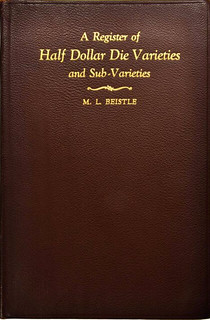 Beistle, Martin Luther (1875-1935), Shippensburg, Pennsylvania. Industrial Magnate, Inventor, Coin Dealer, Numismatist, Author.
Beistle, Martin Luther (1875-1935), Shippensburg, Pennsylvania. Industrial Magnate, Inventor, Coin Dealer, Numismatist, Author.
He was born on June 26, 1875, at Cumberland, Pennsylvania, the fourth son of David W. Pisle Beistle (1810-1884) and Mary Elizabeth "Molly" Redick Redding (1840-1892). The Beistle family comprised four sons : Walter Dewalt; John, William Oliver, and Martin Luther, and three daughters : Bess, Rebecca Jane, and Henrietta. Martin Luther Beistle was their fifth child.
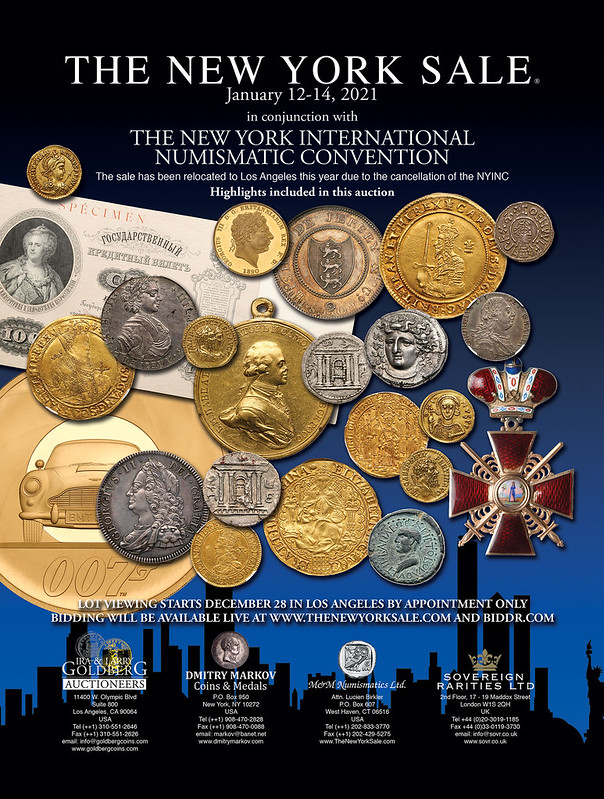
HARVEY STACK'S NUMISMATIC FAMILY, PART 86
The latest article in Harvey Stack's blog series discusses the firm's 1982 sale of the Robison Collection of U.S. and colonial coins. -Editor
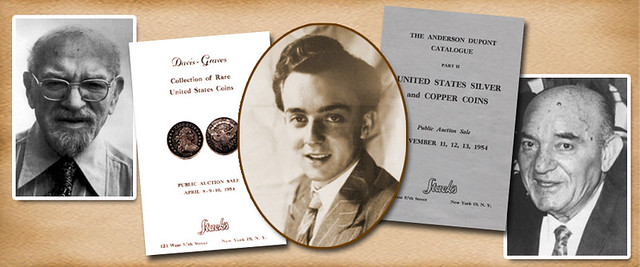
Despite the economic upheaval in 1981 and earlier years, the numismatic market seemed to withstand the uncertainties created by the sharp drop in silver on the precious metals market. While for a few years shows and conventions and the media were dominated by speculation in silver, most numismatic collectors and professional dealers who focused on the wide range of the hobby continued on as they had before this precious metals bubble. And while, of course, these people saw some losses when the silver bubble popped, they were small relative to those suffered by the speculators. Those dedicated to building collections of rare and important coins over a period of time found that their collectibles for the most part retained over 90% of their value.
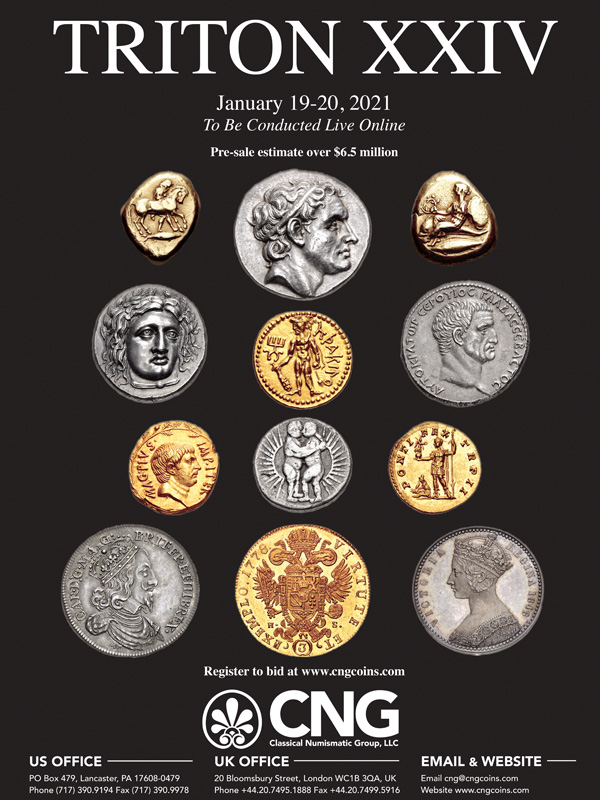
RECOLLECTIONS OF D. WAYNE JOHNSON
Pete Smith submitted these notes on the life of Dick Johnson. Thanks! -Editor
In 2003, Dick and Shirley Johnson drove to Bloomington, Minnesota, to visit their daughter, Rhonda Johnson Rajcula, her husband and Dick's grandsons. By pre-arrangement, I drove to Bloomington on the morning of May 8 to meet Dick. He got in my car and Shirley drove their car for the trip to Green Bay, Wisconsin. Dick had an appointment at the Medalcraft Mint the following day. He was making personal contacts for his research on medals, the artists and the plants that strike medals.
A DICK JOHNSON E-SYLUM SAMPLER
Here are some examples of Dick Johnson's E-Sylum submissions over the years. -Editor
THE BOOK BAZARRE
HERITAGE OFFERS PARTRICK BRASHER DOUBLOONS
There are many great coins coming up in the Partrick Platinum segment of the Heritage Auctions January FUN sale. Cataloguer David Stone kindly sent a reminder when two important highlights went online. Thanks! -Editor
Dave writes:
"The first is the finest-known 1787 New York-style Brasher doubloon, MS65 Star NGC, CAC, in lot 3934 of the catalog. The lot description includes the previously unpublished account of Matthew Stickney's acquisition of this spectacular rarity from a New York bullion broker in 1848.
"The second coin is the closely related, finest-known 1786 Lima doubloon, MS61 NGC, CAC in lot 3935. Only two examples of Brasher's Lima doubloon are known to collectors today and the lot description includes an enhanced image of this coin, with the mysterious missing numerals and letters in the legend illustrated.
"These are among the rarest and most valuable issues in the Colonial series and both coins have been off the market for about 40 years. We just posted the enhanced lot descriptions for these coins, with extra images and hyperlinks to the important introductory section of the catalog on Ephraim Brasher's life, accomplishments, and other private coinage. We think readers would be interested to read about these important early rarities."
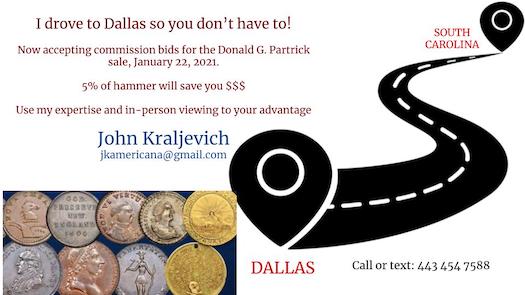
STACKS-BOWERS OFFERS RARE HAITIAN NOTES
Currency Auction Associate Christopher Dahncke of Stack's Bowers published a blog article about a large assortment of Haitian Notes on the firm's January 2021 sale. -Editor
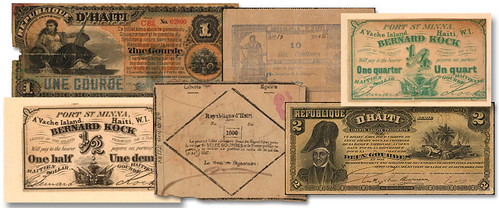
Stacks Bowers Galleries is pleased to present a large assortment of Haitian notes in our January 2021 auction. We are offering 53 notes from Haiti, split between our Live and Internet sessions. These notes span from the 1820s through the 1960s, offering notes from the early Republic of Haiti, through the U.S. Civil War period and up to more modern times.
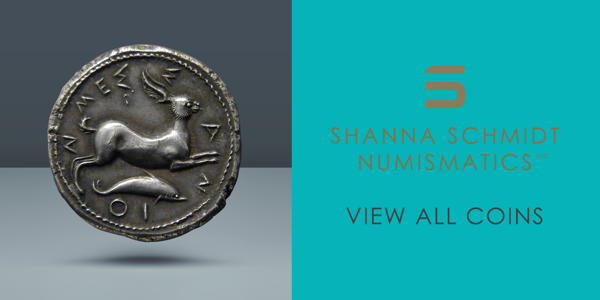
DNW NORTH YORKSHIRE MOORS PART IV SALE
Dix Noonan Webb of London are selling the fourth and final part of Marvin Lessen's North Yorkshire Moors collection of British coins. Here's the press release. -Editor
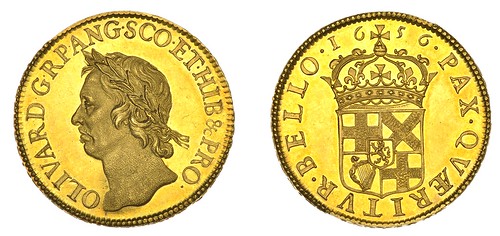
Lot 1142
The fourth and Final Part of the North Yorkshire Moors Collection of Coins and Medals will be offered in a live/online auction by International coins, medals, banknotes and jewellery specialists Dix Noonan Webb on Thursday, January 21, 2021.
Amassed by American-born Marvin Lessen, who later moved to Scarborough in North Yorkshire. The highlight of the Collection of 200 lots is an extremely fine and rare Oliver Cromwell 50 shilling gold coin, dating from 1656 by Thomas Simon, who was Cromwell's chief engraver. Depicting a portrait of Cromwell, this coin is estimated to fetch £100,000-150,000 and only 12 specimens are believed to exist, with most being in institutions [lot 1142].
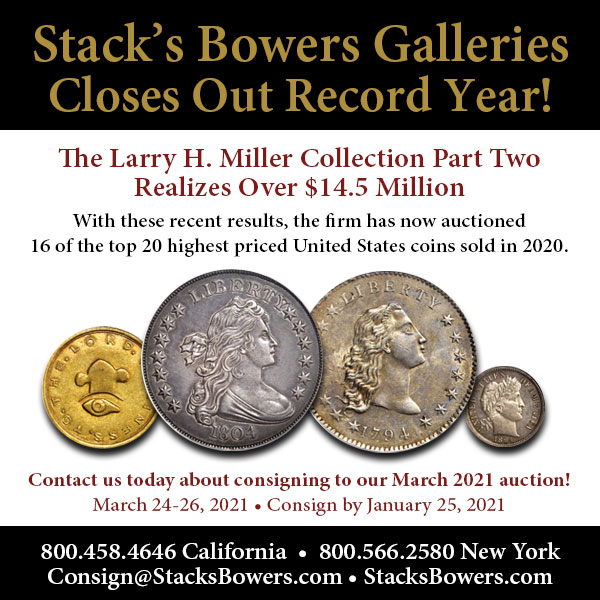
NUMISMATIC NUGGETS: JANUARY 3, 2020
Here's a selection of interesting or unusual items I came across in the marketplace this week. Tell us what you think of some of these. -Editor
Wilkins Counterstamp on 1823 Irish Halfpence
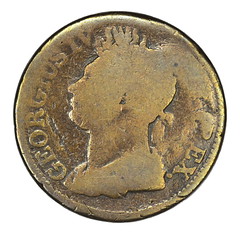
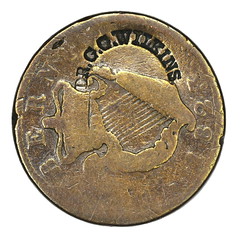
1823 Irish Halfpence (KM 150)
Countermarked "DR. G. G. WILKINS." (stamped in an arc)
Dr. G. G. Wilkins was an infamous dentist in Pittsfield, New Hampshire, who also sold firearms and animal pelts among other items, and thus his building acquired the name "Fort Wilkins". (I have seen an image of his building.)
Date of issue: Circa 1860's.
Place of issue: Pittsfield, New Hampshire.
Brunk W-610.
Rulau M NH 107.
A moderately common counterstamp on a very uncommon undertype. From Bob Merchant's latest eBay offering. -Editor
To read the complete lot description, see:
1823 Irish Halfpence, Counterstamp "DR. G. G. WILKINS." ( Pittsfield, N.H. )
(https://www.ebay.com/itm/1823-Irish-Halfpence-Counterstamp-DR-G-G-WILKINS-Pittsfield-N-H/133619567654)
Other topics this week include a Temperance Movement Pledge token, a 1900 Paris Exposition medal, and a Large Cent pie crimper wheel. -Editor
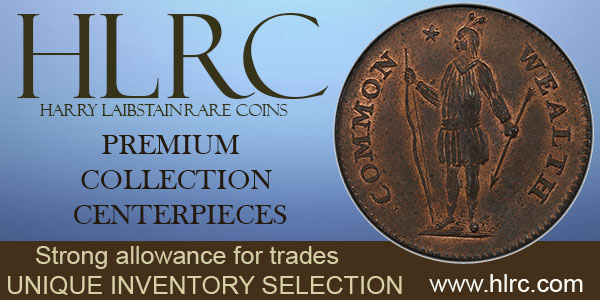
SELECTIONS FROM DAVE WNUCK MAKING THE GRADE #44
In his latest Making the Grade blog post, dealer Dave Wnuck discusses an uncirculated 1793 Chain Cent he recently purchased at $1.5 million. It's already found a buyer, so you can put your wallets down. But some of the chump change in your other pocket might get you another really cool item from his inventory. Here are a few goodies that caught my eye. -Editor
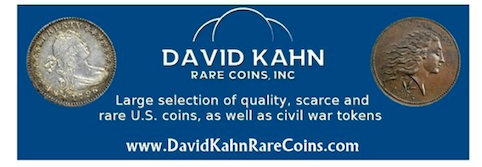
BEWARE ONLINE FAKE COIN SALES
A World Mint News Blog article describes Michael Bugeja's unfortunate experience buying a couple of ancient coins that turned out to be fake. -Editor
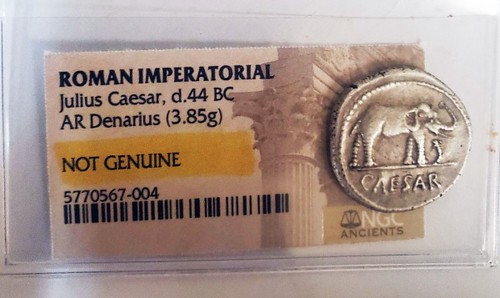
Michael Bugeja, an ancient coin enthusiast, warns about the proliferation of fakes and explains how to avoid buying them. But when you do, you should hold the seller and yourself accountable.
I have had good success in finding, identifying, and slabbing ancient coins. Although I, too, like to hold history, and have raw samples as well, I consign my finds on platforms that only accept holdered coins, using proceeds to continue my hobby. Nevertheless, I sometimes fail to do the necessary analysis before placing a bid. This year I did that twice, winning the above Caesar denarius and a Greek Aegina turtle silver stater. Upon seeing them, I knew they were fake.

REGULATIONS FOR THE ANTIQUITIES MARKET
The New York Times reported on new U.S. banking regulations affecting the antiquities market, which could have ramifications in the ancient coin trade. -Editor
The antiquities trade, which regulators have long feared provided fertile ground for money laundering and other illicit activities, will be subject to greater oversight under legislation passed by Congress on Friday when it overrode President Trump's veto.
The provisions tightening scrutiny of the antiquities market were contained within the sprawling National Defense Authorization Act, which Mr. Trump vetoed last week and which the House and Senate voted to override on Monday and on Friday.
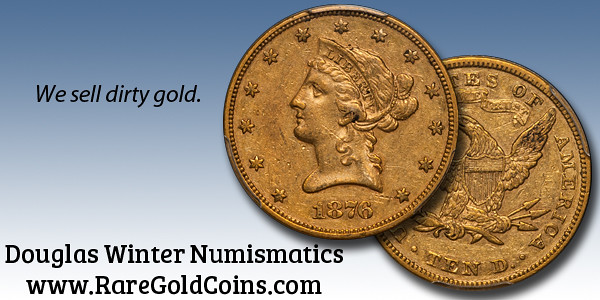
ANOTHER MEDIEVAL CHINESE COIN FOUND IN ENGLAND
David Pickup and Dick Hanscom passed along this blog article about medieval trade links between England and China. Thanks. -Editor
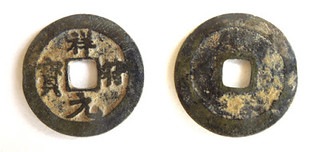 A previous post discussed a find of a Northern Song dynasty Chinese coin from England whose context suggested that it may have been a genuine ancient loss from the medieval period, along with a variety of textual and archaeological evidence for contact between England and East Asia in the Middle Ages. The following post returns briefly to this question, noting the recent discovery of a second Northern Song dynasty coin from England.
A previous post discussed a find of a Northern Song dynasty Chinese coin from England whose context suggested that it may have been a genuine ancient loss from the medieval period, along with a variety of textual and archaeological evidence for contact between England and East Asia in the Middle Ages. The following post returns briefly to this question, noting the recent discovery of a second Northern Song dynasty coin from England.
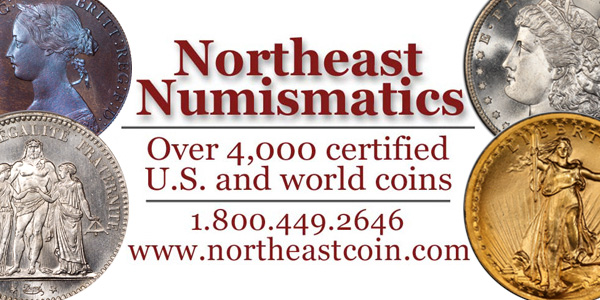
VIDEO DEPICTS WRONG NOBEL MEDAL
Cataloguer John Kraljevich was quoted in an article this week about a curious video tweeted by President Trump. -Editor
Outgoing president Donald Trump tweeted out a video Monday night that had a Nobel Prize superimposed over it, though he's never won one.
The video didn't include the correct medal, either.
The clip tweeted by the president — who has so far refused to concede that he lost the 2020 election to President-elect Joe Biden — lauds him for "[standing] for America," among other things. The unexplained Nobel Prize appears toward the end of the minute-long video, after a title card that declared, "Trump stands for peace."
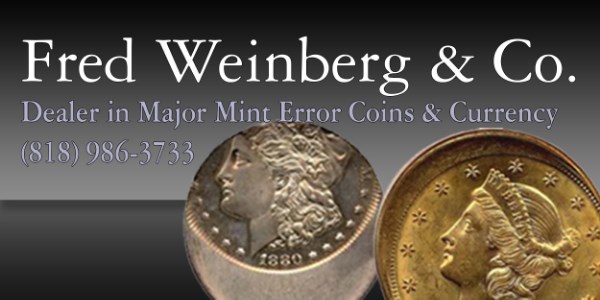
SECRET TO THE PERFECT ZOOM BOOKSHELF
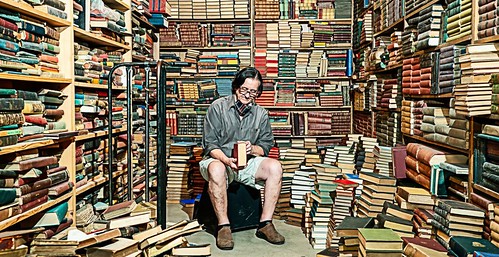
Scott Miller writes:
"I thought this article might be of some interest. I never thought to have my books arranged by a designer; I foolishly did it myself, based loosely on subject and frequency of use.
"Best wishes to everyone for a healthy, happy, and less stressful 2021"
Books by the Foot, a service run by the Maryland-based bookseller Wonder Book, has become a go-to curator of Washington bookshelves, offering precisely what its name sounds like it does. As retro as a shelf of books might seem in an era of flat-panel screens, Books by the Foot has thrived through Democratic and Republican administrations, including that of the book-averse Donald Trump. And this year, the company has seen a twist: When the coronavirus pandemic arrived, Books by the Foot had to adapt to a downturn in office- and hotel-decor business—and an uptick in home-office Zoom backdrops for the talking-head class.

CAPITALISM RESOLVES COIN SHORTAGE PROBLEM
A Wall Street Journal Opinion article by economist Stephen Moore examines the COVID coin shortage. -Editor
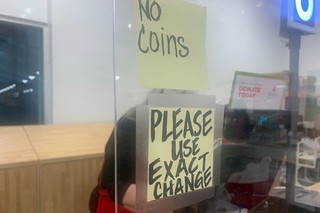 Making change used to be a bit of a joke. A memorable "Saturday Night Live" parody ad in 1988 imagined the "First CityWide Change Bank," which gave its customers the denominations they want: "If you come to us with a $100 bill, we're not going to give you 2,000 nickels—unless that meets your particular change needs."
Making change used to be a bit of a joke. A memorable "Saturday Night Live" parody ad in 1988 imagined the "First CityWide Change Bank," which gave its customers the denominations they want: "If you come to us with a $100 bill, we're not going to give you 2,000 nickels—unless that meets your particular change needs."
Nowadays getting the change you want is no laughing matter. In many cities making change has become a cash cow for some because of the great U.S. coin shortage. Covid has limited banks hours and shut down the retail businesses that often return coins to circulation. It doesn't help that Americans have a tendency to dump coins in shoeboxes and never use them again, keeping many in-circulation quarters and pennies sequestered.
TOOTH FAIRIES
For collectors having nightmares about the disappearance of cash, here's something more to fret over. -Editor
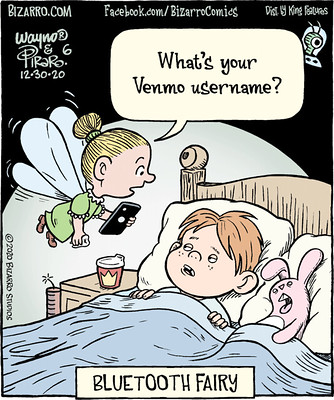

The E-Sylum is an electronic publication of the Numismatic Bibliomania Society
Copyright © 1998 - 2025
